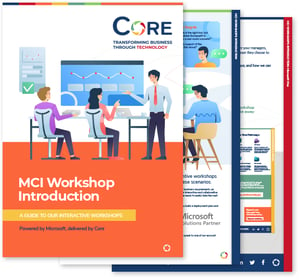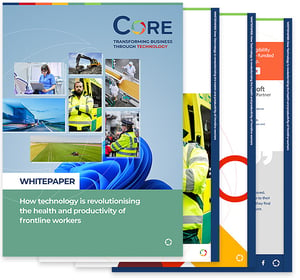I was fortunate enough to attend a Microsoft Education Partner day, which featured a range of seminars and presentations covering some of the latest Microsoft technologies available to the education sector.
The talk that particularly captured my interest discussed the potential for Cloud-based predictive analytics, machine learning and Power BI data visualisation to support education professionals in the drive to improve and maintain student engagement, academic participation and achievement.
Microsoft featured the case study for schools in Tacoma City, Washington State, USA. The staff and students interviewed credited the solution with facilitating an increase in graduation rates, from 55% to 82.6% within five years.
Education professionals within these schools were presented with accessible weekly reports which utilised data collected throughout a student’s education, from Kindergarten to 12th Grade. The data provided insight to the students most in need of assistance or support, highlighting them clearly using data visualisation in Power BI and helping the school to effectively and swiftly direct resources to pre-emptively support students.
Below is the video Microsoft showed at their event, which explains the solution, implementation and the impact predictive analytics powered by Office 365, Azure and machine learning had on how Tacoma City Schools allocated their resources.
Microsoft Case Study - Tacoma City Schools
What is Power BI and machine learning?
Microsoft state that Power BI is:
“…a cloud-based analytics service that enables anyone to visualise and analyse data with greater speed, efficiency and understanding. It connects users to a broad range of data through easy to use dashboards, interactive reports and compelling visualisations that bring data to life”.
Power BI is part of the Office 365 E5 stack and the integrated Microsoft 365 Enterprise E5 workplace solution, which comprises Windows 10, Office 365 and Enterprise Mobility and Security (EMS). Therefore, it's part of a comprehensive workplace solution that makes use of built-in enterprise-grade security and seamless integration across a range of applications and services.
Power BI benefits from the flexibility of Cloud working, providing secure and convenient access to the service from mobile devices, enabling greater working flexibility across classrooms and sites. Strict access controls and security is built in the form of Office 365 Advanced Threat Protection (ATP), which helps to protect the highly-sensitive data that schools hold.
By hosting the service in Azure, there is scalable data storage and consumption which is simple, secure and cost-effective, delivering all the associated benefits of Cloud computing. Furthermore, by ensuring effective connectivity to Azure and Office 365, schools can expect faster access and consumption of their services than with on-premise infrastructure, which further increases efficiency and productivity.
Machine learning is an area of work within the larger field of Artificial Intelligence and is concerned with using algorithms to analyse data to generate insights, make predictions and improve decision-making without the need to programme every single action.
Machine learning and Power BI work together, harnessing high-quality data to produce predictions and visualise insights in clear reports which support stakeholders in proactive and pre-emptive action.
How can predictive analytics support the education sector?
Every organisation seeks to use the data they do have intelligently, to inform strategy, maximise resources and work more efficiently. However, certain sectors may not have the time or resources to interpret and gain valuable insights from the data they hold.
Many educational institutions hold a significant volume of data which has the potential to provide incredible insight into students. By augmenting the skills and judgements of educational professionals with clear, fast and accurate predictive analytics, schools and universities can maximise their resources and act pre-emptively to help all their students, including the most vulnerable. This will improve the opportunity for every student to reach their potential and attain various levels of academic achievement.
There is a significant social and economic benefit in supporting students to earn academic qualifications, as they will have more options in the future and be more likely to enjoy stable and well-paid careers. Furthermore, every school is targeted and assessed on the academic results of their students, as well as the gap in performance between students from various backgrounds and levels of disadvantage. Educational professionals are therefore incentivised to find ways to close these gaps.
Schools possess data on where a student lives, which schools a student has attended, whether they are in a single-parent home, domestic free school meal entitlement, their attendance record, their exam scores and other information that could be relevant to a student’s academic performance. Factoring in more detailed, intuitive data gained from the insight of education professionals including class participation, lack of breakfast/lunch or behavioural changes, this data can be analysed and brought to life to identify students in need of resources and support.
This solution is a response to the challenges of time, scale and resources, augmenting the skills of education professionals in planning strategies to support students and identify those in need amongst a class of forty or a school of thousands.
A holistic view
One of the most significant factors of a student failing to achieve in their education is their economic background. By the time they leave primary school, over a third of students eligible for free school meals will not have achieved the Government standard for reading, writing and maths (Teach First).
Furthermore, only 20% of students from the top 10% most deprived areas in the UK will attend university, compared to around 50% of students from the least deprived 10% (BBC News, 2017).
Research strongly indicates that the impact of the wealth gap on education begins to emerge at an early age and continues to have an impact throughout a student’s entire academic journey. It is therefore logical for any proposed solution to be delivered as early as possible in the academic process, and offset the impact of this disadvantage immediately.
Of course, not all students who struggle with their education are from economically disadvantaged backgrounds or areas. Any student can suffer challenges to their education for a variety of reasons and this solution does not focus solely on economic factors. However, as one of the biggest risk factors associated with academic under-performance, the solution’s ability to correlate socioeconomic indicators with other factors of academic under-performance and disengagement is key.
Impediments to a student’s education can be found both in and out of the classroom. By utilising data on academic performance and behaviour alongside other influential factors in a student’s life, the solution can more effectively identify students in need.
Educational institutions already hold the data to unlock incredible insights into their students, while the skills of education professionals are also at their disposal. There is currently a lack of time and resources to analyse the data and produce a detailed insight for every student.
Furthermore, a data-driven strategy requires the agreement and participation of all staff, students and their families, who are committed to achieving an agreed upon definition of success. Without consistent and universal interaction and participation in this approach, the prospect of early and effective intervention will be reduced. This solution is not a silver bullet and there are significant challenges to its efficacy which revolve around implementation, investment, engagement and proper use.
It is vital to listen to education professionals and allow them to explain the challenges they face in their work and how this solution could be most effectively deployed. It is vital to bring them on board, as the external imposition of a solution with minimal consultation will likely lead to poor adoption.
Intervention
In recent years, UK schools have intensified the focus on examinations to reveal student intelligence and comprehension, with government plans to increase the frequency of testing on children as young as four years old revealed in early 2018. However, the potential efficacy of this plan was challenged by professionals in the education industry.
More recently, Ofsted Chief Inspector Amanda Spielman expressed an intention to move their inspections away from focusing on exams, which she feared had distracted from the overall effectiveness of schools and turned teachers into “data managers”.
Of course, examinations and testing have a key place in education, but they tend to reveal how a student failed or succeeded, not why or when.
By collecting and analysing data constantly, which not only covers academic performance but also contributing risk factors, it is possible to detect why and when a child is struggling at an earlier stage, or is at risk of doing so, therefore providing an opportunity to intervene before underachievement begins to escalate.
A data-driven approach to the allocation of resources and intervention means opportunities to intervene can be identified earlier and more effectively, before a student falls behind, fails an exam or drops out of education altogether.
Networks and resources
In the Microsoft case study of Tacoma City Schools, we see that these schools are part of a network operating under an authority fully invested in creating effective communication, a reliable database and the achievement of shared objectives. While the technology is key to interpreting the data, there must be cohesion and collaboration between students, schools and all stakeholders, including parents and families, to provide and access the data and act upon the insights gained.
As well as the network of schools in Tacoma City, the schools are under the guidance of a Chief Information Officer, who oversees the implementation of this technology, and a Superintendent with the drive and vision to acknowledge a problem, identify an innovative and future-proof solution and deliver it.
In the UK, the structure of education is different. Local councils and schools are being asked to find significant savings in their budgets, while academisation has led to many schools moving away from the authority of Local Councils and becoming responsible for their own budgets as an independent academy, or as one academy within a Multi-Academy Trust (MAT). There are a variety of funding models in the UK which can inject resources into a school or group of schools, enabling a greater collaboration and spending power that the solution would benefit from.
To implement this technology, it would be helpful for schools to be part of a network of schools, due to the collective economic resources and collaboration this can support, as shown in the Tacoma City example. An independent school which is not part of a wider network of shared resources could face difficulties in delivering this technology to its maximum potential.
Universities
For universities, the ethical case to adopt this solution is just as strong. But there is an additional compelling business case to be made...
Universities in the UK currently charge up to a maximum of £9,250 for attendance, making them more capable of affording and embracing the latest technology than state schools. However, according to the Microsoft seminar, every year an average of 10% of university students drop out of their course and university altogether. As a result, each university loses, on average, £20 million pounds per year in tuition fee revenue.
Should the increased graduation rates demonstrated by Tacoma City Schools be representative of what a university can achieve, the business case for UK universities would be clear.
For the full potential of this service to be achieved, universities may need access to data collected by schools and colleges throughout a student’s education once a student commences studies there. This may pose some data privacy issues, as well as considerations for students from other countries where the socio-economic and the data collected and retained are different.
Conclusion
Predictive analytics offers the UK education system an opportunity to make use of the vast data it holds and address the major causes of academic disengagement and underperformance, at a time when the structure of state education is moving away from local council authority, and significant budget savings are required.
By adopting cloud-based predictive analytics with data visualisation to augment the skills of education professionals, schools and universities can increase the chances of successful intervention in circumstances that are negatively affecting a student’s education, both in and out of the classroom.
Furthermore, at a time when there are fewer teachers and significant demands on resources, the prospect of augmenting the capabilities of education professionals through quick, accurate and accessible data analysis and insights which eases the pressure on time and resources, should be an attractive one.
Crucially, this technology must be implemented with the full support of professionals within the education sector, not imposed externally. While it will likely work best through the cooperation of multiple schools across all age groups and requires top-down implementation and financing, it is essential that all stakeholders are brought together and agree to the use and shared goals of the solution.
What can Core do?
Core are a highly-accredited Microsoft Gold Partner, specialising in driving quick consumption of Microsoft 365 with IP Co-Sell solutions and Managed Services. We have delivered a range of successful projects for educational institutions including the University of Law and the University of Leeds.
Core currently manage aspects of IT Enterprise for central and local government organisations including Windows 10 Managed Desktops, Office 365, Cloud and on-premise environments and complex Identity and Access Management solutions. More than 30,000 users in 57 countries already use Core’s Azure-hosted services every day.
Core has partnered with Beezy, an award-winning enterprise collaboration solution for Office 365, to deliver Power BI capability to their customer solutions within one engaging environment. This enables visualisation of data detailing employee engagement and user experience, supporting collaboration, knowledge sharing and employee action. Core’s capability with Power BI in user-friendly collaborative Intranets makes us an ideal partner for any educational institution looking to implement an engaging, effective and simple solution based on advanced Office 365 features.
We have extensive experience migrating organisations to Office 365 and Azure, as well as maintaining and securing these Cloud environments, alongside managed Windows 10 Desktops. Thanks to our industry-leading record of innovation and success in complex and high-pressure projects for organisations with significant security considerations, our customers can be fully assured of Core’s ability to design, implement and support complex solutions and services for organisations of all sizes and industries.






